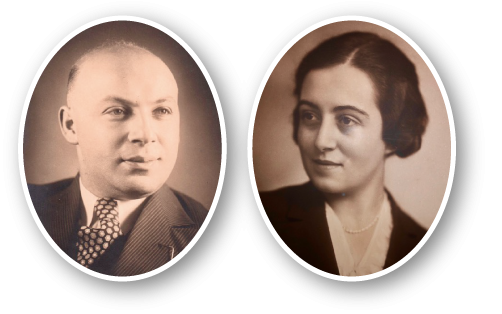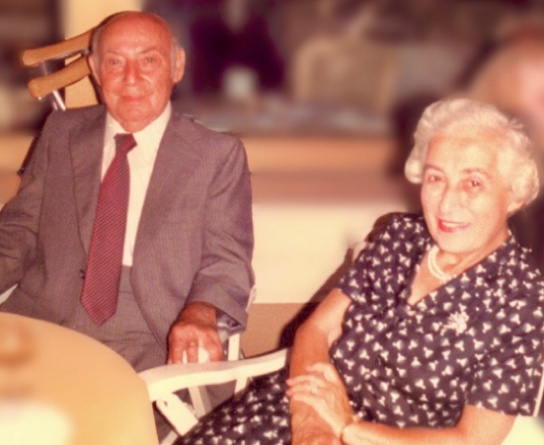Karl and Martha Kohn biography

Karl Kohn and Martha Sternberg were born and raised in established, upstanding German Jewish families in the Franconia region of Bavaria. They grew up just 55 kilometers apart. Both families had lived in the region for more than 200 years, the Kohns in a farming community and the Sternbergs in the city.
Karl Kohn was born November 26, 1907, to Hermann and Amalie Kohn (née Schwab), in the small community of Gerolzhofen. His parents operated a hardware, tool, and home goods company that serviced the surrounding farms. As a boy, Karl helped his father in the store but still found time to perfect his soccer game. Karl quickly learned the business and traveled around the area buying and selling merchandise. His young adulthood was marred by the rise of the German National Socialist Party in the 1930s, and Karl, more than once, came into conflict with local authorities. The suppression of their rights and liberties and the danger posed to Jewish citizens prompted Karl’s parents to arrange for him to leave Germany for the United States in May 1936.
Martha Sternberg was born January 18, 1914, to Louis and Hedwig Sternberg (née Nebel) in Bamberg, a medieval city known for its large churches, canals and architecture. Louis was an established hops merchant, and the family resided close to the city center. Martha and her younger sister Ilse enjoyed a middle-class life. However, as the threat to Jewish citizens by the German National Socialist Party emerged, Martha’s parents secured a position for her as an au pair in France. Shortly thereafter, in June 1937, Martha left for New York.
Karl and Martha met in Manhattan shortly after her arrival. Heading home from work one evening, they boarded the A Train at Columbus Circle. As the train pulled out of the station, Karl proposed marriage. Martha said she would have to think about it. Karl loving replied that she had until the train reached 125th street station, the very next stop, to give him her answer. Martha agreed to give it a try. They married in October 1937. The Kohns settled in the Fort Washington Heights area of upper Manhattan, an enclave of German Jewish immigrants.
Like many around them, Karl and Martha began to remake their lives, always with their families in Germany in mind. Martha’s parents and younger sister were able to emigrate to the United States in 1938. In early 1939, Karl’s parents, Hermann and Amalie, left Germany for Amsterdam where his sister, Rosl, and her family were living. As the Kohns prepared to leave for the United States, they were stopped by the occupying German government. In 1943, they were deported to Sobibor, a concentration camp in Poland. Hermann and Amalie were both killed on May 28, 1943.
Karl found work in New York’s hardware industry, building upon knowledge he gained from his father, and Martha worked in a manufacturing facility where she allocated resources necessary to meet the growing national need for industrial tools. In the early 1940s, Karl founded General Hardware, his own wholesale hardware company, by walking the streets of Manhattan selling tools that were not rationed for the war effort. Over the years, General Hardware grew to be among the largest wholesale hardware companies in the New York City area. Martha was a principal part of this effort providing the office expertise in buying and selling tools.
In March 1943 the Kohn family grew when Lenore Barbara was born. She was joined in April 1945 by twins, Arlene Susan, born with Down syndrome, and Harold Lewis. With their three children, Karl and Martha moved to Middle Village in Queens, New York, along with Martha’s mother, Hedwig Sternberg, by then a widow. Here they raised their family, only moving to Forest Hills, New York, after the children were in college. In the early 1970s, the Kohns retired to Englewood, New Jersey.

Karl Kohn was a man of extraordinary courage. In addition to being forced to leave his homeland and his parents’ tragic deaths, Karl struggled early with crippling rheumatoid arthritis as well as meeting the challenges of his daughter Arlene’s needs. While these circumstances framed his life, he was still a bold risk taker, a man who was comfortable around others, and who always had a twinkle in his eye.
Martha Sternberg Kohn was a petite, bright, self-contained, and serious woman whose moral compass never wavered. Throughout her life, she maintained her own voice and recognized the need to defend the opportunities of others whose rights were threatened. Martha was a practical woman, and her actions were always grounded in reality. Karl’s and Martha’s commitment to their children remained solid, and the children’s needs always came first. Their principles and perspectives molded their children. Karl passed away in Englewood, New Jersey, on June 25, 1983 and Martha in Denver, Colorado, on April 17, 2003.
The Kohn Charitable Trust is pleased to establish the Karl and Martha Kohn Professorship of Social Policy at the University of Michigan’s Ford School of Public Policy. The Kohns’ lives were irrevocably affected by the events in Germany in the 1930s and 1940s. The National Socialist Party policies of exclusion and discrimination altered their life paths, but they overcame those roadblocks. We trust that this position will contribute to policies and actions that advance equity and inclusion of all residents of the United States.
Written by Dr. Harold and Carol Kohn, Directors Kohn Charitable Trust